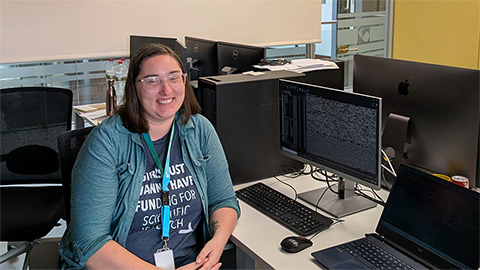
Visa issues? PIs can help.
If you’re a principal investigator, there’s a good chance you’ve had international students and postdocs in your lab. At least one of them has probably had visa or immigration problems. You might think there’s nothing you can do for them, but that’s not true.
I want to share my own experience and, in doing so, show PIs how they can help these trainee scientists.

First, a bit of background. In 1999–2000, I was a Robert Wood Johnson health policy fellow working in the Senate Health Committee under the tutelage of the late, and sorely missed, Sen. Edward M. (Ted) Kennedy. Unlike many RWJ fellows, I returned to my lab even as I continued to dabble in policy.
When I got back to Chicago, one of my postdocs was being threatened with deportation to China. I don’t recall the precise details. However, Sen. Kennedy’s immigration staffer was a consummate pro, and I reached out to her. The problem was fixed in a few days.
There must have been a vibrant network among postdocs, as shortly after this, I received a series of calls and emails from colleagues at other Chicago institutions that could be summarized as “I heard you can do wonders with immigration; can you help my student/postdoc?”
Of course, I had to tell them no, Sen. Kennedy couldn’t help them; his office had helped me as a favor to a former staffer. However, I did suggest they reach out to the local offices of Illinois senators or representatives, and I heard back that, for the most part, this was successful.
Constituent service is an important job for members of Congress, and they will help even people in their state who cannot vote, as long as those people are making a meaningful contribution. Members have access to specific persons in the Departments of State or Homeland Security who can help solve visa problems.
Granted, some members of Congress are more effective than others. Some aren’t very good at constituent service, but those members tend to have a shorter half-life in office. Many offices are quite adept.
When I was working on the Hill, I received a call from a friend at Duke who asked me to help with his wife’s immigration status (they were originally Canadian). I told him someone would call him. He called again the next week to tell me that someone from Sen. Jesse Helms’ office had contacted him. Helms was a conservative noted for his opposition to civil rights and affirmative action, and my friend said he was not fond of the senator (I doubt that many North Carolina academics were). I reminded him that the only thing that mattered to the senator was that he was a constituent. The issue was resolved in less than two weeks.
Many universities wish to limit their faculties’ contact with members of Congress. However, with visa and immigration questions, you are asking only for you and your trainee, and the only relevance to the university is that your research benefits. If you live and work in an urban area, the person who represents the university may not be the one who represents you as a resident. Your senator or representative’s staff are providing assistance on your behalf. They want to help you because they hope you will tell your friends and relatives that their office fixed the problem. And when they do, everybody wins.
Enjoy reading ASBMB Today?
Become a member to receive the print edition four times a year and the digital edition monthly.
Learn moreGet the latest from ASBMB Today
Enter your email address, and we’ll send you a weekly email with recent articles, interviews and more.
Latest in Opinions
Opinions highlights or most popular articles

Women’s health cannot leave rare diseases behind
A physician living with lymphangioleiomyomatosis and a basic scientist explain why patient-driven, trial-ready research is essential to turning momentum into meaningful progress.

Making my spicy brain work for me
Researcher Reid Blanchett reflects on her journey navigating mental health struggles through graduate school. She found a new path in bioinformatics, proving that science can be flexible, forgiving and full of second chances.

The tortoise wins: How slowing down saved my Ph.D.
Graduate student Amy Bounds reflects on how slowing down in the lab not only improved her relationship with work but also made her a more productive scientist.

How pediatric cataracts shaped my scientific journey
Undergraduate student Grace Jones shares how she transformed her childhood cataract diagnosis into a scientific purpose. She explores how biochemistry can bring a clearer vision to others, and how personal history can shape discovery.

Debugging my code and teaching with ChatGPT
AI tools like ChatGPT have changed the way an assistant professor teaches and does research. But, he asserts that real growth still comes from struggle, and educators must help students use AI wisely — as scaffolds, not shortcuts.

AI in the lab: The power of smarter questions
An assistant professor discusses AI's evolution from a buzzword to a trusted research partner. It helps streamline reviews, troubleshoot code, save time and spark ideas, but its success relies on combining AI with expertise and critical thinking.

